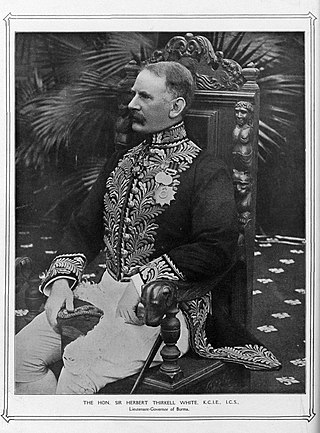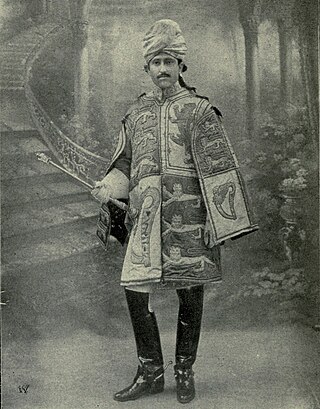Related Research Articles

The Most Eminent Order of the Indian Empire is an order of chivalry founded by Queen Victoria on 1 January 1878. The Order includes members of three classes:
- Knight Grand Commander (GCIE)
- Knight Commander (KCIE)
- Companion (CIE)
Sir Ram Singh KCIE was the Maharaj-Rana of Dholpur from 1901 until his death in 1911.

Sir Reginald Henry Craddock, was a British colonial official and politician, who served in the Indian Civil Service and as Lieutenant-governor of Burma. He later became a Conservative Party Member of Parliament (MP) and sat on the Joint Committee on Indian Constitutional Reform as a strong opponent of Indian nationalism.

Sir Herbert Thirkell White (1855–1931) was the Lieutenant-Governor of the British Indian province of Burma (1905–1910) and author of works about Burma.

Major General Nawab Sir Umar Hayat Khan Tiwana, was a soldier of the Indian Empire, one of the largest landholders in the Punjab, and an elected member of the Council of State of India.

The Indian Medical Service (IMS) was a military medical service in British India, which also had some civilian functions. It served during the two World Wars, and remained in existence until the independence of India in 1947. Many of its officers, who were both British and Indian, served in civilian hospitals.
Sir Henry Robert Conway Dobbs was an administrator in British India and High Commissioner of Iraq.
Nawab Muhammad Ali Beg, (1852–1930) was an Indian military leader from Hyderabad State, serving there and in the British Indian Army.

Sir Arthur Upton Fanshawe, (1848-1931) was a British civil servant in India during the British Raj. He served primarily in the Indian Post Office.

Sir Walter Roper Lawrence, 1st Baronet,, was a member of the Council of India and an English author who served in the Indian Civil Service in British India and wrote travelogues based on his experiences of travelling around the Indian Subcontinent. Over the course of his travels, he developed a close affinity with the Indian and Kashmiri people, who figure prominently in his work. His best-known books are The Valley of Kashmir (1895) and The India we Served (1929).
Lieutenant-Colonel Sir Hugh Daly, was a British Indian Army officer and colonial administrator.
The Queen's Birthday Honours 1900 were announced on 23 May 1900 in celebration of the birthday of Queen Victoria. The list included appointments to various orders and honours of the United Kingdom and British India.
Major-General Sir Hiraji Jehangir Manekji Cursetji, KCIE, CSI, DSO was an Indian military surgeon and general in the British Indian Army during the Second World War.
Sir Gerald Bomford (1851–1915) was a British surgeon who succeeded Benjamin Franklin as the Director General of the Indian Medical Service and held the post between 1905 and 1910, until being succeeded by Charles Pardey Lukis. His children included Sir Hugh Bomford and Guy Bomford.
The 1892 Birthday Honours were appointments by Queen Victoria to various orders and honours to reward and highlight good works by citizens of the British Empire. The appointments were made to celebrate the official birthday of The Queen, and were published in the London Gazette on 24 May 1892 and in The Times on 25 May 1892.
The 1898 New Year Honours were appointments by Queen Victoria to various orders and honours to reward and highlight good works by members of the British Empire. They were published on 1 January 1898.
The 1903 New Year Honours, announced at the time as the Durbar Honours, were appointments to various orders and honours of the United Kingdom and British India. The list was announced on the day of the 1903 Delhi Durbar held to celebrate the succession of King Edward VII and Queen Alexandra as Emperor and Empress of India. The membership of the two Indian Orders were expanded to allow for all the new appointments.
The 1911 Delhi Durbar was held in December 1911 following the coronation in London in June of that year of King George V and Queen Mary. The King and Queen travelled to Delhi for the Durbar. For the occasion, the statutory limits of the membership of the Order of the Star of India and the Order of the Indian Empire were increased and many appointments were made to these and other orders. These honours were published in a supplement to the London Gazette dated 8 December 1911.
Sir John William Tyler FRCS (Edin.) CIE was a British surgeon and superintendent of the central prison in Agra, India, a position he held for 14 years. While superintendent he developed the prison as an important manufacturing centre for high-quality carpets. In 1886, he escorted 34 Indians, mostly prisoners, to the Colonial and Indian Exhibition of 1886 in London, where their craftsmanship in weaving carpets was displayed. At Queen Victoria's request, he recruited the servant Abdul Karim, later known as "the Munshi", who served her for the last 14 years of her life.
Lieutenant-general Sir Ernest William Charles Bradfield was an English first-class cricketer and British Army officer. Graduating from St Mary's Hospital Medical School, he joined the Indian Medical Service in 1903 and would serve in campaigns in the North-West Frontier Province of British India and in the Mesopotamian campaign of the First World War. He would go onto hold a number of senior appointments within the Indian Medical Service, rising to the rank of lieutenant-general. Bradfield was noted as being infleuential in the establishment of the Indian Army Medical Corps during the Second World War. In addition to his lengthy and decorated military career, Bradfield also played first-class cricket on four occasions for the Europeans cricket team in India.
References
- ↑ Govt. Sectt., N.W.P. and Oudh (1881). "Educational department". History of services of gazetted officers employed under the government of the N.W.P. and Oudh. Allahabad: North-Western Provinces and Oudh Govt. Press. p. 290.
- ↑ Hart′s Army list, 1903
- ↑ "No. 27469". The London Gazette . 29 August 1902. p. 5609.
- ↑ Great Britain. India Office The India List and India Office List for 1905 , p. 145, at Google Books
- ↑ "The Durbar Honours". The Times. No. 36966. London. 1 January 1903. p. 8.
- ↑ "No. 27511". The London Gazette (Supplement). 1 January 1903. p. 3.
- Obituary: p. 161, The Annual Register: a review of public events at home and abroad, for the year 1917. London: Longmans, Green and Co. 1918.